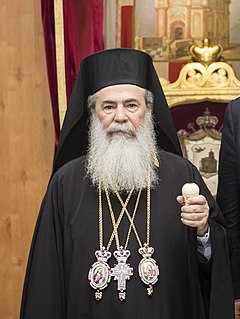
Zechariah is a figure in the New Testament Bible and the Quran, hence venerated in Christianity and Islam. In the Bible, he is the father of John the Baptist, a priest of the sons of Aaron in the Gospel of Luke (1:67-79), and the husband of Elizabeth who is a relative of the Virgin Mary.

The highest-ranking bishops in Eastern Orthodoxy, Oriental Orthodoxy, the Catholic Church, and the Church of the East are termed patriarchs.

The Greek Orthodox Patriarch of Jerusalem or Eastern Orthodox Patriarch of Jerusalem, officially Patriarch of Jerusalem, is the head bishop of the Greek Orthodox Patriarchate of Jerusalem, ranking fourth of nine Patriarchs in the Eastern Orthodox Church. Since 2005, the Eastern Orthodox Patriarch of Jerusalem has been Theophilos III. The Patriarch is styled "Patriarch of the Holy City of Jerusalem and all Holy Land, Syria, beyond the Jordan River, Cana of Galilee, and Holy Zion." The Patriarch is the head of the Brotherhood of the Holy Sepulchre, and the religious leader of about 130,000 Eastern Orthodox Christians in the Holy Land, most of them Palestinians.
Flavian II of Antioch was the Patriarch of Antioch from 498 until his deposition in 512.

The Assyrian Church of the East, officially the Holy Apostolic Catholic Assyrian Church of the East, is an Eastern Christian church that follows the traditional christology and ecclesiology of the historical Church of the East. It belongs to the eastern branch of Syriac Christianity, and employs the Divine Liturgy of Saints Addai and Mari belonging to the East Syrian Rite. Its main spoken language is Syriac, a dialect of Eastern Aramaic, and the majority of its adherents are ethnic Assyrians.

The Greek Orthodox Church of Antioch, also known as the Antiochian Orthodox Church and legally as the Greek Orthodox Patriarchate of Antioch and All the East, is an autocephalous Greek Orthodox Church within the wider communion of Eastern Orthodox Christianity. Headed by the Greek Orthodox Patriarch of Antioch, it considers itself the successor to the Christian community founded in Antioch by the Apostles Peter and Paul.
Saint Elias, the Latin form of the Hebrew name Elijah, may refer to any of:

The Greek Orthodox Church of Jerusalem, officially called simply the Patriarchate of Jerusalem, is an autocephalous Church within the wider communion of the Eastern Orthodox Christianity. It is headed by the Greek Orthodox Patriarch of Jerusalem, the incumbent being Theophilos III since 2005. Christians believe that it was in Jerusalem that the Church was established on the day of Pentecost with the descent of the Holy Spirit on the disciples of Jesus Christ and that the Gospel of Christ spread from Jerusalem. The Church celebrates its liturgy in the Byzantine Rite, whose original language is Koine Greek, the original language of the New Testament, and follows its own calendar of feasts, preserving the Julian calendar. It is also often called "Σιωνίτις Εκκλησία".
Irenaios Skopelitis was the 140th patriarch of the Eastern Orthodox Patriarchate of Jerusalem from 2000 to 2005, though the dismissal was disputed.

The Melkite Greek Catholic Church is an Eastern Catholic Church in full communion with the Holy See as part of the worldwide Catholic Church. It is headed by Patriarch Youssef Absi, S.M.S.P., headquartered in Cathedral of Our Lady of the Dormition, Damascus, Syria. The Melkites, Byzantine Rite Catholics, trace their history to the early Christians of Antioch, formerly part of Syria and now in Turkey, of the 1st century AD, where Christianity was introduced by Saint Peter.

Alphabetical list of Eastern Christianity-related articles on English Wikipedia

Patriarch Theophilos III of Jerusalem is the current Patriarch of the Orthodox Church of Jerusalem. He is styled "Patriarch of the Holy City of Jerusalem and all Palestine and Israel."
Maximos IV Sayegh was Patriarch of Antioch and All the East, and Alexandria and Jerusalem of the Melkite Greek Catholic Church from 1947 until his death in 1967. One of the fathers of Second Vatican Council, the outspoken patriarch stirred the Council by urging reconciliation between the Catholic and Eastern Orthodox churches. He accepted the title of cardinal in 1965 after Pope Paul VI clarified the significance of that title in the case of an Eastern Patriarch.
Elias Zoghby was the Melkite Greek Catholic Archbishop of Baalbek and a leading advocate of Catholic-Orthodox ecumenism. He is best known for his ecumenical interventions during Vatican II and his 1995 Profession of Faith, known as the Zoghby Initiative, which attempted to re-establish communion between the Melkite Greek Catholic Church and the Eastern Orthodox Church while maintaining communion with the Roman Catholic Church.
Patriarch Elias may refer to:
Sophronius II, served as Ecumenical Patriarch of Constantinople during the period 1775–80 and, as Sophronius V, Greek Orthodox Patriarch of Jerusalem in 1771–75.
George of Jerusalem was the Patriarch of Jerusalem from 797 until his death. Little is known about his activities while he was patriarch. At the time, the Church of Jerusalem was under the Abbasid Caliphate.
Eliya ibn ʿUbaid also called Īlīyā al-Jawharī, was a theologian, philosopher, canonist and chronographer of the Church of the East. He served as the bishop of Jerusalem from 878 or 879 until 893 and then archbishop of Damascus. He wrote in Arabic. He died after 903.








